Welcome to Part 6 of our <Study Abroad in Japan> series!
You’re a student, why would you want to work? As a student studying abroad, you might be looking for a little extra money to spend, or if you need the money to pay bills or rent.
Whatever your reasons are for looking for a part-time job (arubaito or baito for short), read to learn more about what you need to find part-time jobs in Japan and how to find one from start to finish.

Hello readers! Sakura Mobile is a SIM Wi-Fi service provider for international residents and tourists in Japan.
Our global editorial team living in Japan will introduce the country’s charms based on what we have experienced and felt.
Study Abroad in Japan Series
(Part 1) Before Leaving: What should I pack and prepare?
(Part 2) Upon Arriving: What to Get Done at the Airport
(Part 3) After Arrival: 4 Important Procedures to Get Done Right Away
(Part 4) Setting up Utilities and Internet
(Part 5) Furniture Shop Recommendations
Study Abroad in Japan (Part 6): How to Find Part-Time Jobs in Japan (Arubaito)
Table of Contents
Checklist Before Applying
Do You Have a Work Permit?
Before you start searching for part-time jobs in Japan, make sure you have a work permit.
Work permits for foreign students studying in Japan allow you to work 28 hours per week.
You can apply for a work permit upon entry to Japan at the airport, which you can read more about in our “Study Abroad in Japan (Part 2) Upon Arriving: What to Get Done at the Airport” blog.
If you have already entered the country and wish to apply for a work permit, you must go to the immigration office to get it.
When you go to the immigration office, you will need to bring:
- Application for Permission to Engage in Activity Other Than That Permitted Under Status of Residence Previously Granted
- Your Residence Card
- Your Passport
Do Your Research About the Jobs
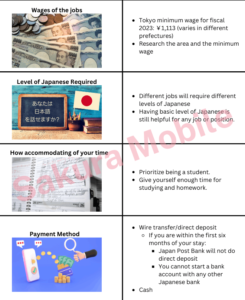
Do You Need a Resume?
 Most companies, when working part-time, will not require you to have a Japanese resume or what is known as rirekisho, but they do require a resume to some degree.
Most companies, when working part-time, will not require you to have a Japanese resume or what is known as rirekisho, but they do require a resume to some degree.
If you need a rirekisho you will also need a photo of yourself attached. This will be a passport or visa-sized photo (approximately 3cm x 4cm).
If you apply for jobs online, some sites require you to fill out information, such as your work history, which companies will consider. But when going into an interview, it’s always good to have a hard copy of your resume in case they ask for it.
↑ Go back to the table of contents
Where Do I Look for Part-Time Jobs in Japan?
Once you have your work permit and resume ready, you may wonder where you should start looking for these jobs. There are various resources you can use as a student.
 Start at Your Career Office
Start at Your Career Office
Your school may have a career office or support center to help you look for jobs. This is a convenient source, as they may suggest job openings on campus.
If you plan on staying in Japan after graduation, you should familiarize yourself with the staff there to make looking for jobs for after graduation easier and less intimidating.
 Check Out Flyers
Check Out Flyers
As part of the career support center, your school may also post flyers around campus advertising part-time work. These may be posted on bulletin boards or in classrooms.
Restaurants and cafes may also post help-wanted signs outside their store or on their windows.
Ask Friends or Classmates
Some jobs offer their existing workers a bonus for bringing in new people. This is a way these businesses promote their company without paying for advertising outside of their existing workers.
If you know people who already work part-time, you can ask them if their workplace is hiring.

Websites Always Having Listings
Here, I’ll introduce various websites you can use for baito hunting. These websites can also be used for job hunting if you decide to try to look for a full-time job in Japan after graduation.
Depending on the type of job you’re searching for, there are a lot of other websites that are more specific for the type of job.
TIP: When applying for jobs online, you should have a reliable Wi-Fi provider. Searching for jobs is already stressful, so make it a little easier by applying for Sakura Mobile’s Wi-Fi, so you have one less thing to worry about. Check out our Wi-Fi plans here.
↑ Go back to the table of contents
What Kind of Jobs Are Popular?
Now that you know how to find a part-time job and where you might be wondering what kind of jobs to look at.
Some popular part-time jobs are English teacher, conveyor belt sushi employee, and babysitter.
English Teacher Might be an Easy Fit

As a native English speaker, the easiest job to look for is an English teaching job.
There are different formats of English teaching:
- English conversation cafes
- English schools (generally teaching young children)
- Private tutor
I made the mistake of taking the first job that I got hired for, but you should apply for different jobs and look at the reviews of the place before accepting the position. Even a customer’s perspective can be helpful in learning how the business is run.
Pros
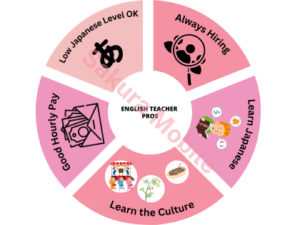
Cons

↑ Go back to the table of contents
Enjoy Customer Service Jobs? Try Conveyer Belt Sushi Restaurant (Kaitenzushi)

The job depends on the position you are trying to apply for.
If you are at the cash register, a busboy, or possibly working as a chef in the back, are all different jobs and experiences.
Popular kaitenzushi restaurants might include Kura sushi, Sushiro, Uobei, and Kappa Sushi.
Even though kaitenzushi might be the ideal job for practicing your Japanese, you should already be able to speak and understand a relatively high level to speak and learn from your supervisors who, most likely, only speak Japanese or are native Japanese.
Pros

Cons
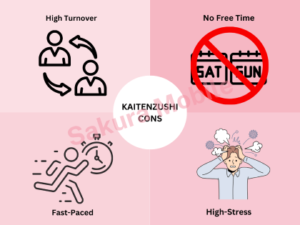
↑ Go back to the table of contents
Are You Good With Kids? Try Babysitting
If you enjoy working with kids, babysitting is also a potential baito opportunity.
Depending on the job, if it’s through a job board or you are going through a company, the pay can be surprisingly high. I once saw a job posted in my school that paid over 10,000 yen an hour.
The job can be a little informal, and the pay may come in irregularly.
Also, due to this being more informal, you should confirm the type of payment and the amount with the parents.
You may also need a relatively high level of Japanese to communicate with the child you are looking after and the parents.
Pros
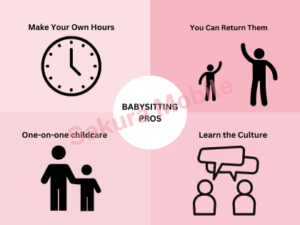
Cons
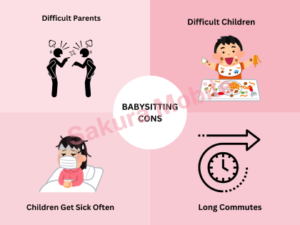
↑ Go back to the table of contents
What To Do After You’re Hired
After you’re hired and you have signed your contract, keep your copy of the contract filed somewhere safe.
If your work requires a uniform, make sure you set aside days to clean your uniform if you take it home so it doesn’t start to smell, or if it gets dirty, it isn’t stained.
Also make sure you set reasonable hours that allow you time for school and studying. Make sure to add your work hours into your calendar, whether it be on your phone or a physical calendar, so you’re not late to work or you don’t miss work.
Make sure you have internet access and a phone number to receive calls!
Voice Phone Plan
Companies or employers will need a Japanese phone number to be able to contact you. Or if you decide to babysit, even if you don’t go through a company for jobs, the child’s parents will most likely want to be able to contact you.
If you have a phone plan with data, you can also check the work schedule at the last minute on the go.
Sakura Mobile offers various plans for Long-term postpaid voice + data services. Find the one that best suits your needs using the link below.
LINK: Sakura Mobile Voice + Data SIM

Home Internet

Depending on the company, you may need to work at home because of natural disasters, like earthquakes or typhoons. Remote work also became more common after the COVID-19 pandemic.
Instead of relying on your phone’s cellular data for remote work or meetings, it’s better to use a dedicated Wi-Fi service.
Sakura Mobile offers options like pocket Wi-Fi, home WiFi internet, and fiber-optic internet. Check out the link below for more information on our home internet services!
LINK: Sakura Mobile Home Internet
↑ Go back to the table of contents
Conclusion
- Before you start looking for part-time jobs in Japan, again, make sure you have a work permit. Some jobs don’t look at it, but it is necessary to work in Japan.
- English teaching: easy to find due to availability, but potentially long and/or frequent working times.
- Kaitenzushi: A good place to practice your Japanese, but high turnaround due to the work environment.
- Babysitting: potentially high wages, but a high level of Japanese language is needed.
Now that you know how to find part-time jobs in Japan, whatever job you are looking at or end up at, having a good long-term cellular provider to contact your employer and a reliable Wi-Fi service to look for jobs and to work from home if needed is essential.
If you are looking to move to Japan to study abroad or for work, check out our previous articles to help with the process!


